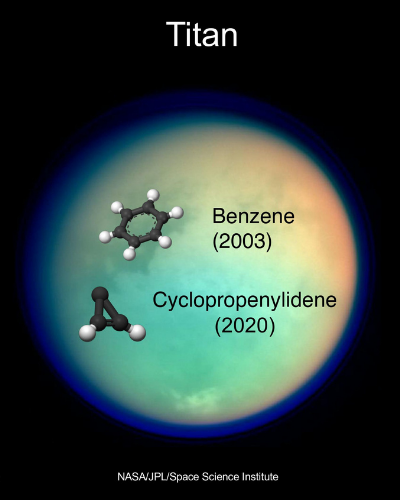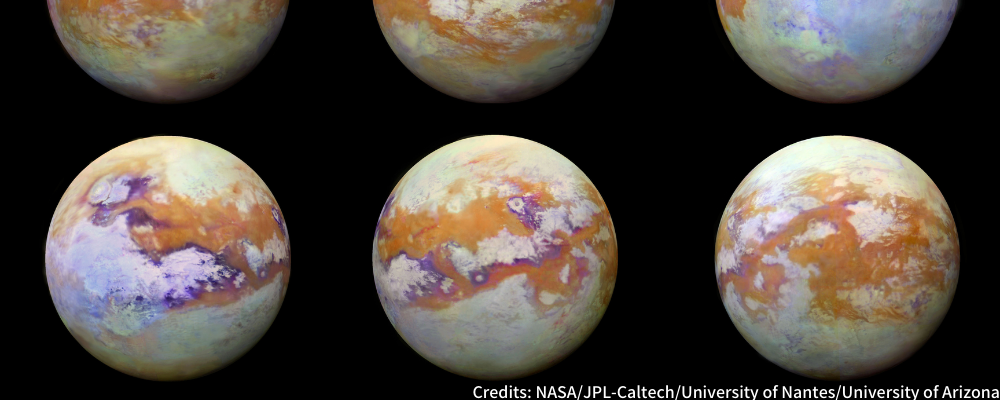NASA の科学者が土星の衛星タイタン Titan の大気中に、他の惑星や衛星の大気からはこれまでに検出されたことのない気体分子を発見しました。
‘Weird’ Molecule in Titan’s Atmosphere
シクロプロペニリデン cyclopropenylidene C3H2 と呼ばれるこの気体分子、地球上では実験室でしか見ることのできない非常に珍しい物質なのだそうです。
反応性の高い簡単な構造のこの有機分子は、生命を構成するより複雑な分子の前駆体となり得るそうです。
NASA の科学者を驚かせたこの発見について、専門用語や英語表現と合わせて見ていきたいと思います。
Contents
解説:衛星タイタンの大気に“奇妙な”ガス分子を発見
奇妙なガス分子の発見
NASA の科学者が、土星の衛星タイタン Titan の大気成分中に奇妙なガス分子を検出しました。
NASA scientists identified a molecule in Titan’s atmosphere that has never been detected in any other atmosphere. In fact, many chemists have probably barely heard of it or know how to pronounce it: cyclopropenylidene, or C3H2. Scientists say that this simple carbon-based molecule may be a precursor to more complex compounds that could form or feed possible life on Titan.
NASA|‘Weird’ Molecule in Titan’s Atmosphere より引用
シクロプロペニリデン cyclopropenylidene という名のその分子は、分子式は C3H2 で、化学者もなかなか聞いたことのないような物質なのだそうです。
この簡単な構造の有機分子ですが、タイタンにおいて生命を構成する分子になり得る可能性があるそうです。
precursor は こちらの記事 で解説していますが、前駆体・前駆現象 という意味です。
この発見はチリ北部にあるALMA 望遠鏡(Atacama Large Millimeter/submillimeter Array)によってもたらされました。
Researchers found C3H2 by using a radio telescope observatory in northern Chile known as the Atacama Large Millimeter/submillimeter Array (ALMA). They noticed C3H2, which is made of carbon and hydrogen, while sifting through a spectrum of unique light signatures collected by the telescope; these revealed the chemical makeup of Titan’s atmosphere by the energy its molecules emitted or absorbed.
NASA|‘Weird’ Molecule in Titan’s Atmosphere より引用
タイタンの大気を構成する化学物質を特定するために、分子に特徴的な光のスペクトルを分析する中で、研究者がこのシクロプロペニリデン C3H2 の存在に気付いたのです。
これまでにも宇宙の観測を通じてこのシクロプロペニリデン C3H2 を見つけたことはありましたが、惑星などの大気中で発見するというのは驚きでした。
Though scientists have found C3H2 in pockets throughout the galaxy, finding it in an atmosphere was a surprise. That’s because cyclopropenylidene can react easily with other molecules it comes into contact with and form different species. Astronomers have so far found C3H2 only in clouds of gas and dust that float between star systems — in other words, regions too cold and diffuse to facilitate many chemical reactions.
NASA|‘Weird’ Molecule in Titan’s Atmosphere より引用
というのも、シクロプロペニリデン C3H2 は反応性が高い物質で、他の分子と出会うと反応して別の分子を形成してしまうのです。
これまで宇宙で発見されたシクロプロペニリデン C3H2 も、星間物質中 ― つまり、非常に低温で希薄なために化学反応が起こりにくいような場所 ― でのみ検出されただけなのです。
タイタンはある意味で地球に似ている
しかし今回このシクロプロペニリデン C3H2 を発見したタイタンの大気は、濃密で化学反応が活発な場所なのです。
But dense atmospheres like Titan’s are hives of chemical activity. That’s a major reason scientists are interested in this moon, which is the destination of NASA’s forthcoming Dragonfly mission. Nixon’s team was able to identify small amounts of C3H2 at Titan likely because they were looking in the upper layers of the moon’s atmosphere, where there are fewer other gases for C3H2 to interact with. Scientists don’t yet know why cyclopropenylidene would show up in Titan’s atmosphere but no other atmosphere. “Titan is unique in our solar system,” Nixon said. “It has proved to be a treasure trove of new molecules.”
NASA|‘Weird’ Molecule in Titan’s Atmosphere より引用
そしてその反応が活発だというところが、多くの科学者の興味を引き付けている最大の理由であり、今後予定している NASA のミッション Dragonfly の目的地としても選ばれているのです。
なぜタイタンの大気中にシクロプロペニリデン C3H2 が存在し、他の衛星などの大気にはないのか、その理由はまだよくわかっていません。
NASA の科学者の Nixon 氏が言うには、タイタンは太陽系の中でも独特であり、新たな分子の宝庫だ、ということです。
土星の 62 個の衛星で最大の衛星であるタイタンは、ある意味で最も地球に似ている世界なのだそうです。
The largest of Saturn’s 62 moons, Titan is an intriguing world that’s in some ways the most similar one to Earth we have found. Unlike any other moon in the solar system — there are more than 200 — Titan has a thick atmosphere that’s four times denser than Earth’s, plus clouds, rain, lakes and rivers, and even a subsurface ocean of salty water.
NASA|‘Weird’ Molecule in Titan’s Atmosphere より引用
地球に比べて 4 倍も濃密な濃い大気があり、雲、雨、湖、川、さらに塩水の海まであるのです。
タイタンの大気は地球のそれのように大部分は窒素で構成されていて、少量のメタンが含まれています。
Titan’s atmosphere is made mostly of nitrogen, like Earth’s, with a hint of methane. When methane and nitrogen molecules break apart under the glare of the Sun, their component atoms unleash a complex web of organic chemistry that has captivated scientists and thrust this moon to the top of the list of the most important targets in NASA’s search for present or past life in the solar system.
NASA|‘Weird’ Molecule in Titan’s Atmosphere より引用
メタンと窒素の分子が太陽光によって分解すると、その構成原子は複雑な化学反応の連鎖を引き起こします。
そしてその活発な化学反応が起こる環境こそが、太陽系における生命の痕跡を探索する NASA の活動にとって最も重要なターゲットのリストのトップにタイタンがいる理由なのです。
タイタンの表面に存在している分子は、地球において生命を構成している分子と同じものである可能性があるそうです。
The types of molecules that might be sitting on Titan’s surface could be the same ones that formed the building blocks of life on Earth. Early in its history, 3.8 to 2.5 billion years ago, when methane filled Earth’s air instead of oxygen, conditions here could have been similar to those on Titan today, scientists suspect.
NASA|‘Weird’ Molecule in Titan’s Atmosphere より引用
誕生間もない地球、38 億年から 25 億年ほど前には、地球の大気は酸素の代わりにメタンが充満していて、それは現在のタイタンの大気のようであっただろう、と推測されています。
“奇妙な”分子 シクロプロペニリデン
このシクロプロペニリデン C3H2 は、これまでのところタイタンの大気で検出されている分子の中では、ベンゼンを除くと唯一の環状分子です。
Cyclopropenylidene is the only other “cyclic,” or closed-loop, molecule besides benzene to have been found in Titan’s atmosphere so far. Although C3H2 is not known to be used in modern-day biological reactions, closed-loop molecules like it are important because they form the backbone rings for the nucleobases of DNA, the complex chemical structure that carries the genetic code of life, and RNA, another critical compound for life’s functions. “The cyclic nature of them opens up this extra branch of chemistry that allows you to build these biologically important molecules,” said Alexander Thelen, a Goddard astrobiologist who worked with Nixon to find C3H2.
NASA|‘Weird’ Molecule in Titan’s Atmosphere より引用

シクロプロペニリデン C3H2 は近年の生物学の反応モデルにおいては利用されることのない分子ではありますが、以下の理由からこのような環状分子は重要な意味を持っているのです。
- DNA の核酸塩基の骨格リングを形成する
- 生命機能において重要な RNA の骨格を形成する
NASA の研究者の Alexander 氏は、環状分子によって、生物学的に重要な分子を構成するための多くの化学反応が導かれる、と述べています。
非情に稀な発見ですが、科学者たちはシクロプロペニリデン C3H2そのものについて、そしてそれがタイタンの大気中で他のガス分子とどのような化学反応を起こすのかについて、より深く学ぼうと努力しています。
Given that it’s a rare find, scientists are trying to learn more about cyclopropenylidene and how it might interact with gases in Titan’s atmosphere.
NASA|‘Weird’ Molecule in Titan’s Atmosphere より引用
今後一体何がわかってくるのか、楽しみですね。
英語表現や専門用語
in pocket:手元にある
Though scientists have found C3H2 in pockets throughout the galaxy, finding it in an atmosphere was a surprise.
NASA|‘Weird’ Molecule in Titan’s Atmosphere より引用
in pocket は 手元にある という意味です。
この記事では galaxy 銀河・宇宙 を探して見つけて in pocket 手元にある というスケールの違いでの表現の対比をしていますね。
他には 金をもうけた という意味もあります。
その場合の反対語は out of pocket 損をした です。
facilitate:促進する・手助けする
Astronomers have so far found C3H2 only in clouds of gas and dust that float between star systems — in other words, regions too cold and diffuse to facilitate many chemical reactions.
NASA|‘Weird’ Molecule in Titan’s Atmosphere より引用
facilitate は 促進する・手助けする という意味です。
この記事では facilitate many chemical reactions 多くの化学反応を促進する という意味になっています。
同意語は
- aid 助ける・援助する
- expedite 早める・促進させる
- promote 促進させる
などがあります。
反対語は
- block 遮る・妨害する・阻害する
- cease やめる・中止する
- halt 中断する・停止する
- impede 妨げる・邪魔をする
- obstruct 妨害する・遮る
などですね。
hive of:中心地・活気にあふれた場所
But dense atmospheres like Titan’s are hives of chemical activity.
NASA|‘Weird’ Molecule in Titan’s Atmosphere より引用
hive of は 中心地・活気にあふれた場所 という意味です。
この記事では hives of chemical activity 化学反応が活発に起こっている場所 という意味です。
hive は ミツバチの巣 のことです。
ミツバチの巣のように人がいっぱいいる場所 → 活気がある場所 という意味になるのですね。
treasure trove:宝の山・宝庫
“It has proved to be a treasure trove of new molecules.”
NASA|‘Weird’ Molecule in Titan’s Atmosphere より引用
treasure trove は 宝の山・宝庫 という意味です。
treasure は 宝物・財宝・貴重品 のことで、trove は 発見物・収集品 という意味です。
この記事では タイタンは新たな分子の宝の山だということが分かった という意味で使われています。
unleash:引き起こす
When methane and nitrogen molecules break apart under the glare of the Sun, their component atoms unleash a complex web of organic chemistry that has captivated scientists and thrust this moon to the top of the list of the most important targets in NASA’s search for present or past life in the solar system.
NASA|‘Weird’ Molecule in Titan’s Atmosphere より引用
unleash は 引き起こす という意味です。
この記事では their component atoms unleash a complex web of organic chemistry これら構成原子が有機化学の複雑な反応系を引き起こす という使い方をしています。
他には 爆発させる・解き放つ・解放する という意味があります。
thrust:押しやる
When methane and nitrogen molecules break apart under the glare of the Sun, their component atoms unleash a complex web of organic chemistry that has captivated scientists and thrust this moon to the top of the list of the most important targets in NASA’s search for present or past life in the solar system.
NASA|‘Weird’ Molecule in Titan’s Atmosphere より引用
thrust は 押しやる という意味です。
この記事では that has thrust this moon to the top このことがこの衛星をトップに押し上げた という意味になります。
派生語の thruster は 小型ロケットエンジン という意味があります。
ion thruster イオンエンジン は宇宙開発関係の話題の中で見かけますね。
まとめ
地球では実験室でしか見られないような分子、cyclopropenylideneシクロプロペニリデン C3H2 が、土星の衛星タイタンで発見された、という記事でした。
この分子は反応性が高く、さらに生物の根源を成すDNAなどの分子の骨格の構成要素にもなり得るということで、地球外での生命発見への期待が高まりますね。
今後のさらなる研究・探索が楽しみです。


